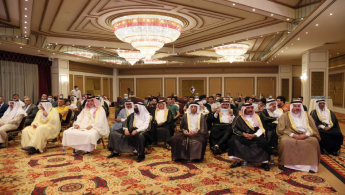Outrage in Iraq after Kurdistan conference calls for normalisation with Israel
The Iraqi government on Saturday announced its outright rejection of calls made to normalise ties with Israel during conference a day earlier in the northern Kurdish city of Erbil.
Titled the "Peace and Recovery Conference", officials from the autonomous Kurdistan region on Friday voiced controversial calls to normalise ties with Israel and follow suit of four Arab nations which did so last year.
In a statement following the conference, the participants claimed they represent tribal leaders and members of 'Sahwat al-Iraq' (Iraq Awakening) group - which has previously battled Al-Qaeda - directing calls to Iraqis to "enter relations with Israel and its people".
However, the leader of Sahwat al-Iraq, Ahmed Abu-Risha, denied that his group had anything to do with the conference, describing the claims as false and slanderous.
"From the depths of moral commitment and responsibility, we declare that they (speakers) do not represent anyone, and they are not allowed to exploit a clan or region" to talk about such an issue, said Abu-Risha.
In response to the conference, Iraqi Prime Minister Mustafa Al-Kazemi strongly condemned the normalisation calls, said such stances only represented the speakers in the event.
"These meetings (conference) do not represent the people and residents of Iraqi cities," the statement read, adding that it was also an attempt to cause controversy and confusion only weeks before Iraqis are set to head to the polls in legislative elections.
Al-Kazemi added that proposing normalisation with Israel was constitutionally rejected in Iraq.
"The government has clearly expressed Iraq’s consistent historical position in support of the just Palestinian cause and its defense of the rights of the Palestinian people, foremost of which is their right to an independent state with Jerusalem as its capital, and rejecting all forms of (Israeli) settlements, aggression and occupation practiced by Israel against the brotherly Palestinian people," Al-Kazemi said.
Several other officials echoed Al-Kazemi, denouncing such stances and stressing Iraq’s firm opposition of Israel and its policies.
Known as the Abraham Accords and mediated by the US, the UAE and Bahrain, followed by Sudan then Morocco had established diplomatic ties with Israel, in a move slammed by much of the Arab world and the Palestinians as a betrayal.
In return for normalising with Israel, the US had promised Sudan that it would be lifted off the state-sponsored terrorist list and helped financially. Morocco was also guaranteed US recognition of its sovereignty over the disputed-Western Sahara territory.





 Follow the Middle East's top stories in English at The New Arab on Google News
Follow the Middle East's top stories in English at The New Arab on Google News


